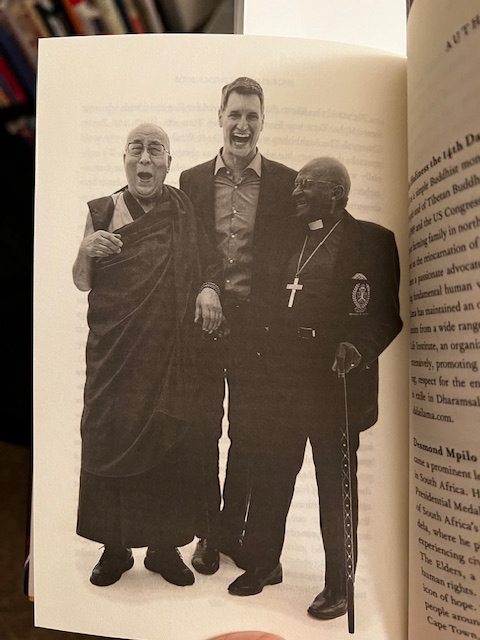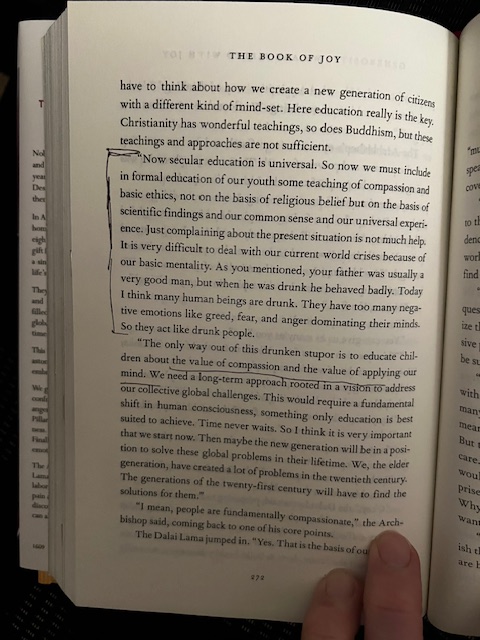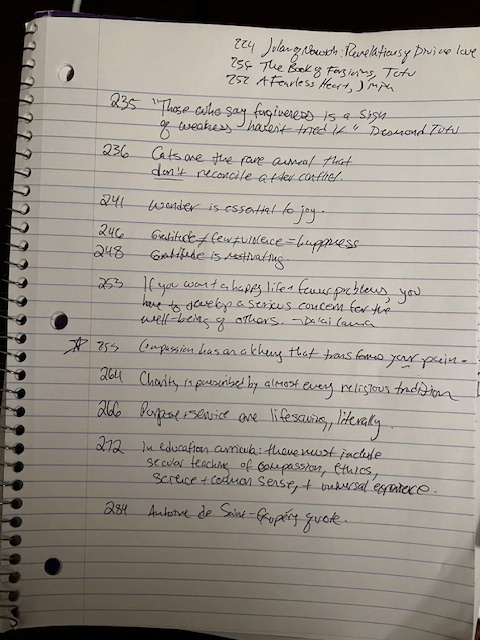Dear Friend,
As we wrap-up our contemplative read of The Book of Joy, I find myself feeling grateful for this experience, for this community, and for you. I suppose I would feel this way regardless of our reading selection this month, but it’s especially nice to stand in this place considering one of the eight pillars of joy is gratitude.

I’ve really loved and enjoyed my experience with this entire book, but this last part, divided into two sections (four pillars of the mind and four pillars of the heart) might have been my favorite part. The chapters are tightly focused and impactful, and as always, the Dalai Lama and Archbishop Tutu expound on the subjects with humor, wisdom, and personal insight. The editor, Douglas Abrams, continues to synthesize their moral and religious teachings with support from scientific studies that “prove” what these leaders say about living is true.
I continue to find much to appreciate in the teaching that having compassion for those who do harmful things is life–and world–changing. We’re brought back to the concept of tonglen, which is this idea of taking and giving. Taking the pain and heartache of others into ourselves, and giving peace, patience, strength, or other positive attributes to those who are struggling. It’s only in the last year or so that I’ve been able to will myself to stop or pause when confronted with someone who is acting out due to pain, fear, or anger, and to respond with compassion. This is such a difficult thing to do, especially when someone’s ire is directed at us, even if it’s not about or intended for us.

I’m reminded of a not-too-distant incident at work, when a colleague was mired in frustrations and letting those frustrations manifest in negativity toward the rest of us (condescension, loss of patience, and sarcastic remarks). Just a year ago, and certainly for most of my life, I probably would have responded in kind. If I was being treated with sarcasm or condescension, I would aim to one-up their attacks with even more pointed ones of my own. After all, how dare they treat me that way, especially when I wasn’t the problem. I’ve learned that this does more harm than good, though, both to the person who is already in pain, and to me, and to the general community or situation we’re in at the time. The Book of Joy and its teachings is filled with reminders about this and about how compassion is the answer to keeping ourselves safe and to ending or easing the suffering of others, which ultimately helps us repair the atmosphere and return to a positive state.
Something else I was most touched by were the ruminations on forgiveness, especially that the Dalai Lama and Desmond Tutu address the unfortunate mistake in believing that forgiveness (or even compassion) is a weakness. The archbishop’s stories from apartheid South Africa are powerful examples of how forgiveness can be a great strength, as is the Dalai Lam’s personal experience of being exiled from China. It’s clear in their teachings and examples that the easy thing to do is not to forgive, and I might even go so far as to say it is lazy and selfish, too. That’s not a judgement, since I’ve absolutely held on to grudges for a long time, sometimes years. And I still struggle to forgive certain things; but there’s an important distinction made in this section: forgive the person, not the act. In other words, it’s possible to forgive a person for acting unjustly, unwisely, unkindly, since we’re all flawed and fallible, but that does not mean we need to condone or forgive the action. Part of compassionate living, in fact, is helping others to see, through your own kindness and willingness to forgive, that your love for them means holding them accountable when they’ve done wrong.
It is an expression of courage and of love to say, I know you can do better than you’ve done, and I want to help you do it. I believe in you, and that’s why I’ll tell you when I think you’ve acted wrongly.

Lastly, I would be remiss not to mention again the wonderful resources at the end of the book, especially the section on “Joy Practices.” Throughout my reading, I underlines and wrote down numerous short prayers, meditations, and blessings that I want to incorporate into my life, when the occasion calls for it. The section in the back, though, is structured into different topics for overcoming the various obstacles to joy and cultivating the various pillars of joy. These come with brief notes of guidance and then actionable steps to take. I’ve bookmarked the section for future (hopefully frequent) use.
Coming Up Next Month
On February 1st, we will begin reading our next selection, Dictee by Theresa Hak Kyung Cha. I’ll be back that day with some introductory information and my own plan for reading, should anyone want to join. Until then, remember to find our conversations on social media with #theCRPBlog!
Meditation
“Those who say forgiveness is a sign of weakness haven’t tried it.” -Desmond Tutu
May you be free,
~Adam
Leave a comment